Have you ever thought of what do red claw crabs eat on beach or natural habitat? These fascinating semi-aquatic crustaceans have specific dietary needs that can be challenging for new owners to understand. If you love to get to know about what different animals and insects eat, take a look at the following:
What Do They has prepared this blog so you’ll learn the answer to what do red claw crabs eats, their feeding behaviors, and how to ensure your pet crab receives proper nutrition for a healthy, active life.
What Are Red Claw Crabs?
Red claw crabs (Perisesarma bidens), sometimes called mini crabs or Thai devil crabs, are small brackish water crustaceans native to Southeast Asia. They’re characterized by:
- Reddish-brown to dark brown bodies
- Bright red claws (especially prominent in males)
- Semi-aquatic lifestyle (need both land and water)
- Size of approximately 2-4 inches across including legs
- Relatively easy care requirements (though they do need brackish water)
These crabs have become increasingly popular in the pet trade due to their striking appearance and interesting behaviors.
Natural Diet of Red Claw Crabs
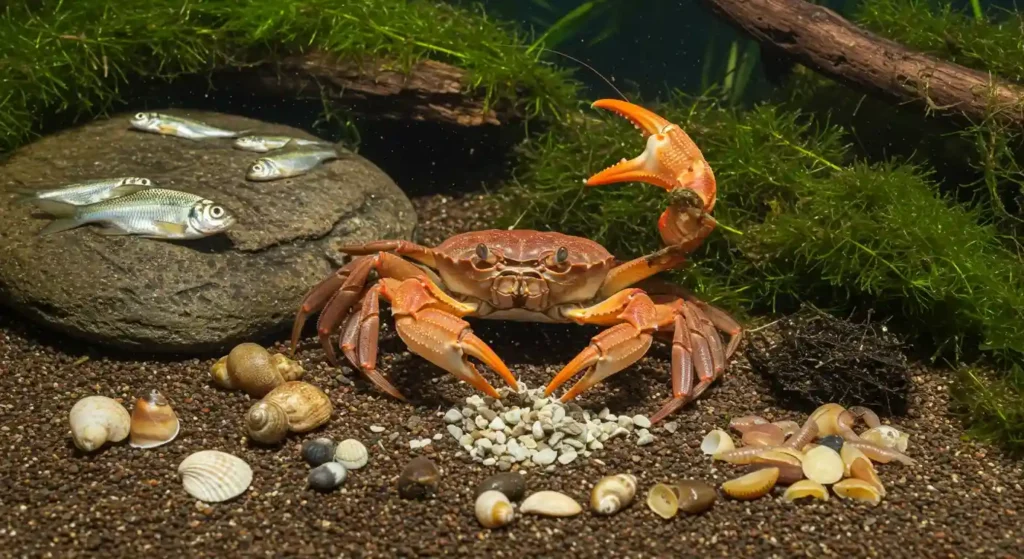
In the wild, what do red claw crabs eat? Their natural diet consists of:
Plant Matter
- Algae
- Decaying leaves
- Aquatic plants
- Roots
- Fallen fruits
Animal Protein
- Small fish
- Insect larvae
- Worms
- Small mollusks
- Other invertebrates
- Carrion (dead animal matter)
Detritus
- Decaying organic material
- Bacterial films
- Particulate matter in substrate
Red claw crabs are true omnivores and opportunistic feeders, consuming virtually anything edible they can find in their mangrove and estuary habitats.
Optimal Diet for Captive Red Claw Crabs
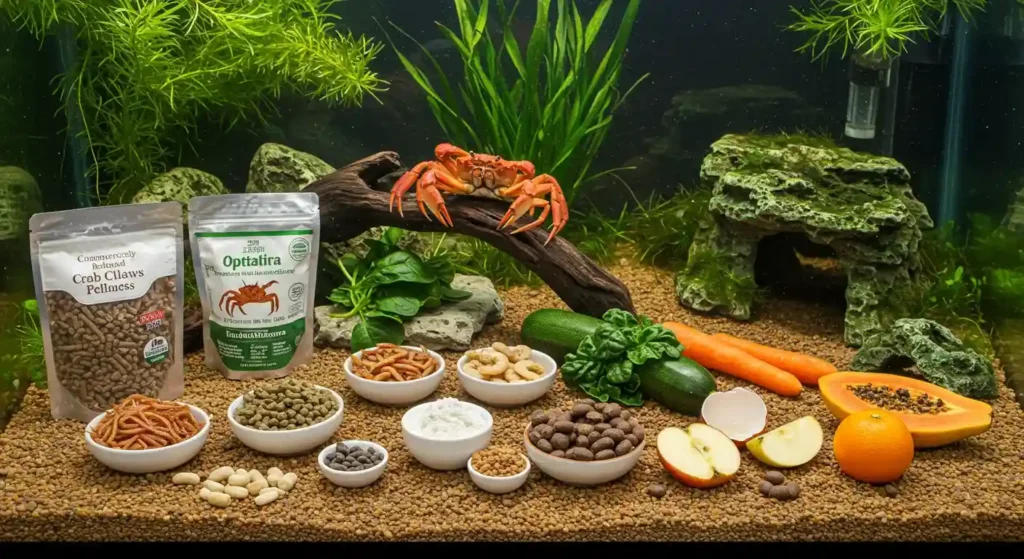
What do red claw crabs eat when kept as pets? A balanced diet should include:
Commercial Foods
- Sinking crab pellets
- Shrimp pellets
- Algae wafers
- Fish food flakes or pellets
Fresh Protein Sources
- Bloodworms (live, frozen, or freeze-dried)
- Brine shrimp
- Small pieces of fish or shrimp
- Daphnia
- Tubifex worms
- Small pieces of uncooked seafood
Plant-Based Foods
- Blanched vegetables (zucchini, carrots, peas)
- Spinach or kale (occasional)
- Algae wafers
- Seaweed sheets
Calcium Supplements
- Cuttlebone pieces
- Calcium-rich commercial supplements
- Crushed eggshells (thoroughly cleaned and boiled)
Feeding Schedule and Amounts
When considering what do red claw crabs eat throughout the week, follow these guidelines:
- Feed small amounts daily or every other day
- Remove uneaten food after a few hours
- Provide protein sources 2-3 times per week
- Offer plant matter 2-3 times per week
- Ensure calcium supplements are always available
Feeding Behaviors of Red Claw Crabs
Understanding how these crabs eat helps provide proper nutrition:
- Scavengers by nature
- Use claws to tear food into manageable pieces
- Will carry food to hiding spots to eat in safety
- More active feeders at night
- May bury or store food for later consumption
- Sometimes display communal feeding
Foods to Avoid
When planning what do red claw crabs eat, avoid these potentially harmful items:
- Citrus fruits (too acidic)
- Processed human foods
- Foods with preservatives or additives
- High-copper content foods
- Foods high in iodine
- Fatty meats
- Spicy or seasoned foods
- Dairy products
Creating a Feeding-Friendly Environment
To encourage natural feeding behaviors:
- Provide various feeding zones both in water and on land
- Include hiding spots near feeding areas
- Use shallow dishes for food on land
- Consider target feeding with tweezers or pipettes
- Place some food items in water and some on land
The Importance of Calcium
What do red claw crabs eat to maintain their exoskeleton? Calcium is crucial for:
- Proper molting
- Exoskeleton development
- Overall health
- Prevention of molting problems
Calcium should be constantly available in their habitat, either as cuttlebone pieces or other supplements.
Signs of Good Nutrition
A well-fed red claw crab will display:
- Active movement
- Bright coloration
- Successful molting
- Growth appropriate to age
- Defensive posturing when approached
- Regular foraging behavior
Common Feeding Problems
Refusal to Eat
If your crab isn’t eating, consider:
- Inappropriate water parameters
- Molting (crabs often stop eating before and after molting)
- Stress from tank mates or environment
- Food not appealing (try different options)
Competition for Food
What do red claw crabs eat when kept in groups? Competition issues can arise:
- Provide multiple feeding stations
- Feed in different areas of the tank
- Ensure adequate hiding places
- Consider separate feeding for smaller or timid crabs
Over or Underfeeding
- Signs of overfeeding: leftover food, water quality issues
- Signs of underfeeding: aggression, cannibalism, slow growth
Seasonal Variations
While not strictly necessary in captivity, mimicking natural seasonal variations in what do red claw crabs eat can promote natural behaviors:
| Season | Diet Emphasis | Feeding Frequency |
|---|---|---|
| Spring | Higher protein | More frequent |
| Summer | Balanced diet | Regular |
| Fall | Slightly more plant matter | Regular |
| Winter | More plant material, less protein | Slightly less frequent |
Molting and Diet
During the molting process, red claw crabs’ dietary needs change:
Pre-Molt
- Often stop eating 1-3 days before molting
- May need extra calcium
During Molt
- Will not eat
- Should not be disturbed
Post-Molt
- Shell is soft and vulnerable
- Need extra calcium
- May eat their shed exoskeleton for nutrients
- Should be protected from tank mates
Breeding Considerations
What do red claw crabs eat when breeding? Breeding crabs benefit from:
- Increased protein intake
- Extra calcium supplements
- More varied diet
- Small, frequent feedings
So the Answer to What do Red Claw Crabs Eat is…
As we’ve explored what do red claw crabs eat, these fascinating crustaceans require a varied omnivorous diet that includes both plant matter and animal protein, along with essential calcium supplements. By providing a diverse menu that mimics their natural feeding patterns, you’ll help ensure your red claw crabs remain healthy, active, and display their natural behaviors.
Remember that proper nutrition, combined with appropriate habitat conditions including the correct brackish water parameters, forms the foundation for successful red claw crab keeping. By understanding what red claw crabs eat in each life stage and during different periods like molting, you can provide optimal care for these charming aquatic pets.


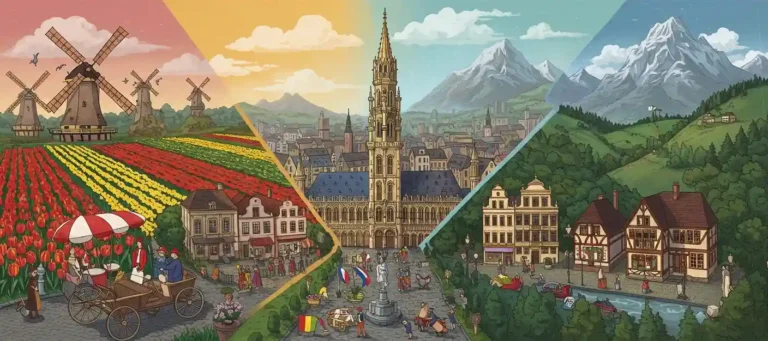

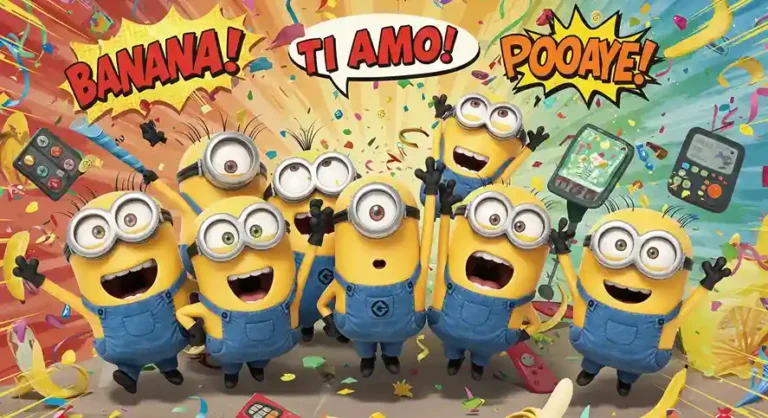

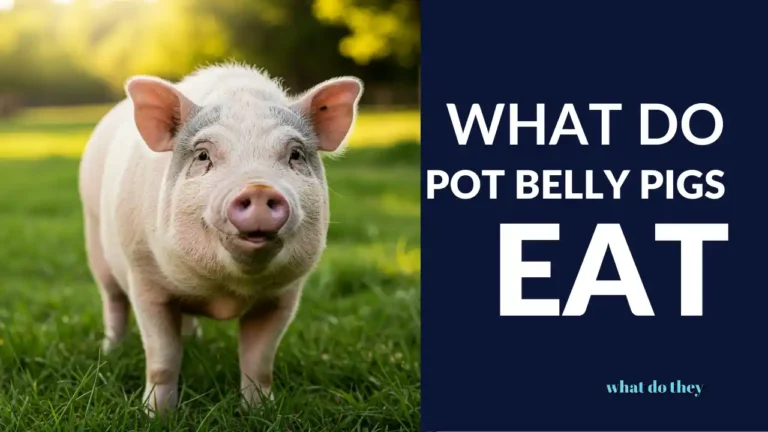

Leave a Comment